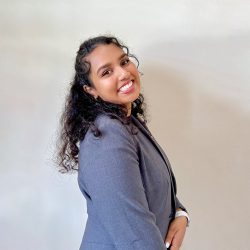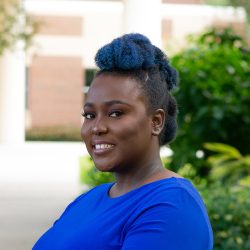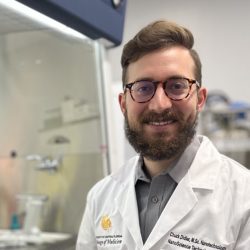Claudia Andl
College of Medicine
Biomedical Sciences PhD
Research Focus:
Cancers of the head and neck and esophagusOver the course of working many summer jobs in her youth, Claudia Andl, PhD realized she wanted a career in a profession that would provide her with a diverse set of challenges every day. She was drawn to the idea of working in a field that confronted her with new questions and opportunities to learn as opposed to following a daily routine. Her passion for science and discovery, along with her desire to help people, inspired her to carry out cutting-edge research about cancers.
Dr. Andl completed her Master's of Science in Cancer Biology at the Ruprecht Karl University in Heidelberg, Germany, where her thesis focused on the expression of cell adhesion components and their loss during metastasis of head and neck cancers. For her doctoral training, she performed her research in the Department of Dermatology at the University of Pennsylvania and later received her PhD in Cell Biology from the University Duisburg-Essen in Germany. She then used that knowledge to extend her research by studying adhesion complex assembly and function. As a post-doctoral researcher in the Gastroenterology Division at the University of Pennsylvania, she applied this expertise and established the platform for her current research program in cell signaling in cancers of the esophagus and head and neck.
In 2016, Dr. Andl began searching for a university where she could further her research in an innovative setting while sharing her knowledge with others. At UCF, she describes how, “we have incredible collaborations that allow us to ask questions outside our field and pursue research as interdisciplinary teams.” She was recognized by the university for her admirable work and instruction with the Excellence in Graduate Teaching Award. Her students also assist her as she carries out her research at the Andl Lab in the Burnett School of Biomedical Sciences.
Through her exploration, Dr. Andl came to understand the complex obstacles that make cancer such a difficult disease to cope with. She draws her inspiration from the captivating processes of the natural world, which led her to pursue a career in scientific research. She describes how she is “in awe when [she] see[s] the microscopic images of snowflakes, the intricacies of a flower in bloom, the fact that the lizard re-grows its tail and that we have a blueprint to making humans.” This deep appreciation for the complexities of the body also moved her to find new ways of helping prevent and treat these diseases more effectively.
Dr. Andl describes how there are still many hurdles to overcome regarding cancer research, asking important questions such as “why despite our advanced technologies are standard treatments not improving; why are still so many patients diagnosed too late; and why is their prognosis still so poor, especially for head and neck cancer.” Her goal is to improve how cancer is treated and devise more preventative measures to protect people from these devastating diseases. She partially attributes this to a general lack of awareness, citing how the commonly advised ways we strive to prevent cancer do not align with the more subtle warning signs of esophageal and oral cancers that often go unrecognized. Such frightening aspects of these cancer types are what drives her research and motivates her to find new ways of helping people combat the disease.
Though the job has its challenges, Dr. Andl finds her work to be highly rewarding. She says, “The rewards are the elated feeling you get from the accomplishments of the people you work with.” In addition, the rapidly evolving tools and advancements in available technology result in constant growth, making science a lifelong rewarding experience. Watching her students come into their own and develop new skills is also highly gratifying for her. “To observe the growth of a student struggling at the bench turn into a professional scientist is amazing,” she says. However, Dr. Andl advises students to ask themselves whether they have a true passion for science because, “being a researcher is not a 9 to 5 job but should be viewed more as a hobby, something you don’t mind doing late at night and almost every weekend.” It requires resilience and grit, so it is not for the faint of heart. Even though her parents often ask if she has finished all her work, she believes her research is never finished because there is always more to discover.
Highlights:
- Head of Andl Lab
Nikhila Mondraty
As a child, Nikhila Mondraty always wanted to be a doctor. Though she had fleeting fantasies of becoming an astronaut or lawyer, she never strayed too far from her dream...
Makella Coudray
Makella Coudray is passionate about advocating for disadvantaged groups. “I personally like championing causes for those that society may overlook, and I try to do that through my work,” she...
Sarah Noureddine
Sarah Noureddine never thought her academic journey would lead her to pursue a career in research. However, she was exposed to an entirely new branch of medicine by volunteering in...
Charles Didier
Charles Didier thought he would become a pastry chef; for most of his young life. His love of cooking and baking, and an artistic influence from his family, made the...




